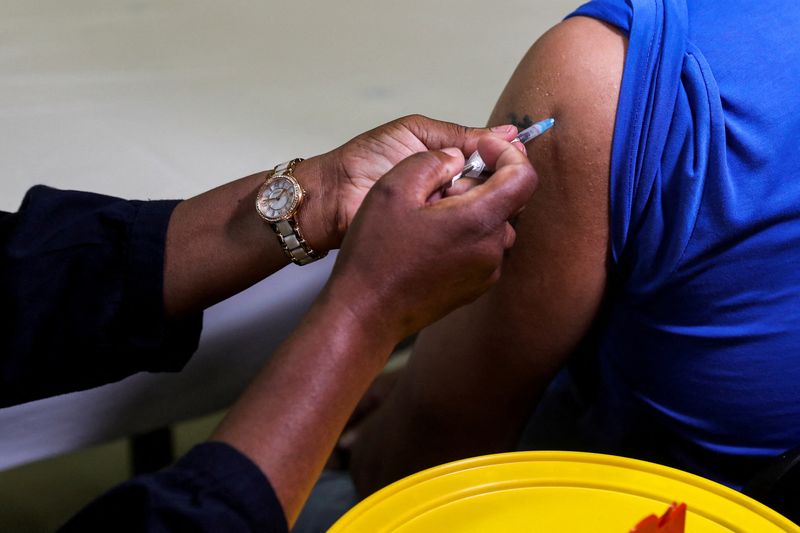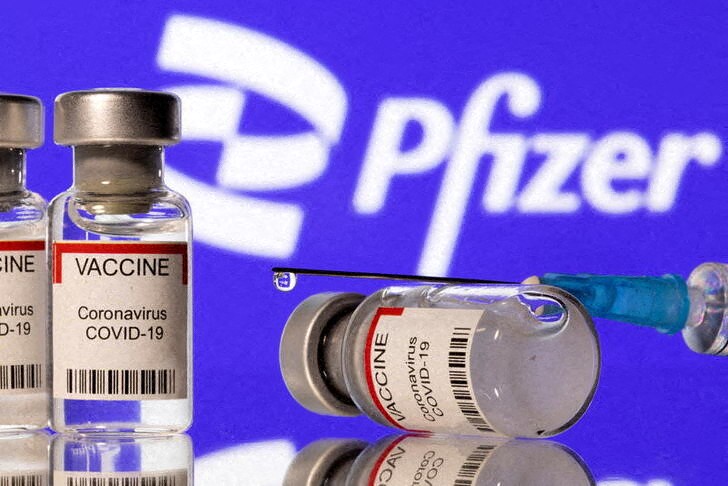By Alexander Winning and Wendell Roelf
JOHANNESBURG (Reuters) - Pfizer-BioNTech's COVID-19 vaccine has been less effective in South Africa at keeping people infected with the virus out of hospital since the Omicron variant emerged last month, a real-world study published on Tuesday showed.
Between Nov. 15 and Dec. 7, people who had received two doses of the shot had a 70% chance of avoiding hospitalisation, down from 93% during the previous wave of Delta infections, the study showed.
When it came to avoiding infection altogether, the study by South Africa's largest private health insurance administrator, Discovery (NASDAQ:DISCA) Health, showed that protection against catching COVID-19 had slumped to 33% from 80% previously.
The findings from the real-world analysis are some of the first about the protection vaccines offer against Omicron outside of laboratory studies, which have so far shown a reduced ability to neutralise the virus.
The study results were based on an analysis by Discovery's clinical research and actuarial teams in collaboration with the South African Medical Research Council (SAMRC).
South Africa alerted the world to Omicron in November, triggering alarm that it could cause another surge in global infections and leading to travel curbs on southern Africa. South Africa's daily infections have since risen to more than 20,000, with 35% of tests coming back positive in figures reported on Tuesday, and a further 600 hospital admissions and 24 deaths.
The South African study was based on more than 211,000 COVID-19 test results of which 78,000 were attributed to Omicron, the variant labelled "of concern" by the World Health Organization and reported in more than 60 countries.
The 78,000 cases were attributed to Omicron based on the relative prevalence of the variant within the country over the study period, but because they have not been confirmed as being the new variant the study cannot offer conclusive findings.
South African scientists sent 630 positive COVID-19 tests for genome sequencing in November to see if they were Omicron and another 61 so far in December. Last month, 78% were confirmed as Omicron and all 61 this month were the new variant.
'CONFOUNDING FACTOR'
Discovery cautioned that the study's findings should be considered preliminary. Michael Head, senior research fellow in global health at the University of Southampton, also said there was a large degree of uncertainty for now about Omicron.
"It is important to avoid inferring too much right now from any national scenario. For example, the narrative around South Africa is that Omicron may be much milder, whereas reports out of Denmark broadly suggests the opposite," he said.
South Africa is using the Pfizer-BioNTech and Johnson & Johnson (NYSE:JNJ) vaccines in its immunisation campaign, with more than 20 million Pfizer (NYSE:PFE) doses administered so far.
J&J and the SAMRC are conducting a large real-world study of J&J's vaccine and recent analysis has shown no deaths from Omicron, SAMRC President Glenda Gray said.
"So that's the good news, it shows again that the vaccine is effective against severe disease and death," she said.
With at least 70% of the South African population estimated to have been exposed to COVID-19 over the past 18 months, high estimated levels of existing antibodies might skew the data.
"This could be a confounding factor for these hospital admission and severity indicators during this Omicron wave," Ryan Noach, chief executive of Discovery Health, said in a briefing on the study.
The analysis showed protection against hospital admission was maintained across all ages, from 18 to 79 years, with slightly lower levels of protection for the elderly.
Protection against admission was also consistent across a range of chronic illnesses including diabetes, hypertension, hypercholesterolemia and other cardiovascular diseases.
REINFECTION RISK
The study concluded there was a higher risk of reinfection during the fourth wave than during previous waves and the risk of hospitalisation among adults diagnosed with COVID-19 was still 29% lower than during the country's first wave last year.
Children appeared to have a 20% higher risk of hospital admission with complications during the fourth wave than during the first, despite a very low absolute incidence, it said.
"This is early data and requires careful follow up," said Shirley Collie, chief health analytics actuary at Discovery Health.
However, this trend aligns with a warning in recent days from South Africa's National Institute for Communicable Diseases (NICD) that during the country's third wave from June to September they had seen an increase in paediatric admissions and now, in the fourth wave, they are seeing a similar increase in admissions for children under five, she said.
South African scientists have said they cannot confirm a link between Omicron and the high admissions of infants, which could be due to other factors.
Many unknowns still surround Omicron.

The WHO has said there were early signs that vaccinated and previously infected people would not build enough antibodies to ward off an Omicron infection, resulting in high transmission rates, but was unclear whether Omicron was inherently more contagious than the globally dominant Delta variant.
Pfizer and BioNTech said last week that two shots of their vaccine may still protect against severe disease, because its mutations were unlikely to evade the T-cells' response.
